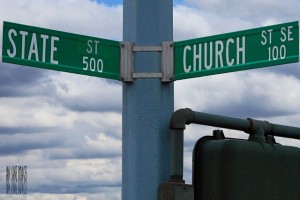Justice Kennedy is better known for his rhetorical flair than his practical guidance. But his majority opinion in Town of Greece v. Galloway provides a roadmap local governments can follow to stay out of trouble when beginning city council meetings with a prayer.
But his majority opinion in Town of Greece v. Galloway provides a roadmap local governments can follow to stay out of trouble when beginning city council meetings with a prayer.
Town of Greece resolves two issues: whether prayers must be nonsectarian and whether prayers before city council meetings are coercive.
The Court concludes that sectarian prayers that overtly refer to a specific faith are okay—to a point. Sectarian prayers can go too far “[i]f the course and practice over time shows that the invocations denigrate nonbelievers or religious minorities, threaten damnation, or preach conversion.”
Prayers before local government bodies aren’t unconstitutional just because attendees often have business before the boards (and may not want to join in the prayer). But coercion could be possible “if town board members directed the public to participate in the prayers, singled out dissidents for opprobrium, or indicated that their decisions might be influenced by a person’s acquiescence in the prayer opportunity.”
This decision will have the biggest impact in the Second Circuit (Connecticut, New York, and Vermont) and the Fourth Circuit (Maryland, Virginia, West Virginia, North Carolina, and South Carolina). The Second Circuit had declared Greece’s prayer practice unconstitutional focusing on the Christian nature of most of the prayers. The Fourth Circuit in Joyner v. Forsyth County, 653 F.3d 341 (4th Cir. 2011) had ruled that only nonsectarian prayer at local board meetings is constitutional.
Image courtesty of Flickr by Ian Sane (creative-commons license, no changes made).
